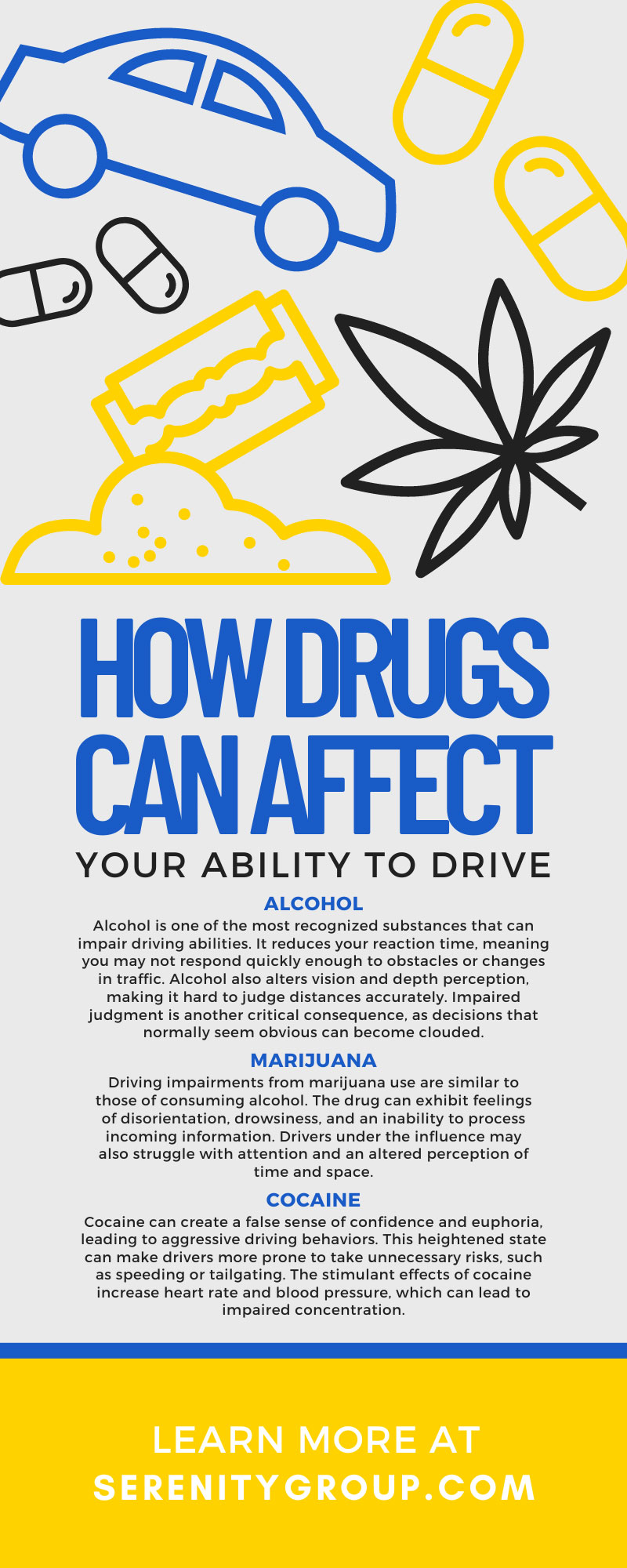How Drugs Can Affect Your Ability To Drive

Recreational and medicinal drugs can impair a person’s ability to drive. The influence of drugs can severely affect a person’s judgment, alertness, coordination, and other cognitive skills necessary for operating a vehicle. This type of impairment is referred to as drug-impaired driving, and it is a leading cause of fatal car accidents in America. We will explore how various drugs can impact your driving skills and what legal implications you might face if caught driving under their influence.
Types of Driving Impairment
Most people associate impaired driving with being under the influence of alcohol while operating a vehicle. However, substances other than alcohol and specific health conditions can negatively affect a person’s driving ability to similar degrees. For example, illicit recreational drugs, legal prescription drugs, sleep deprivation, and neurological disorders like epilepsy can all impair driving.
State laws vary in defining levels of intoxication and the specific charge a driver will face. They could be convicted of a DUI, which stands for driving under the influence, or a DWI, which stands for driving while intoxicated. Regardless of the legal limit, any substance that impairs your ability to drive endangers yourself and others on the road.
How is Drug Impairment Measured
Measuring drug impairment is not as straightforward as determining whether a person is under the influence of alcohol. Drunk driving is assessed using field sobriety tests and a breathalyzer reading to ascertain blood alcohol concentration. While law enforcement uses field sobriety tests to assess drug intoxication, confirming the level of inebriation requires different types of tests.
When a driver is pulled over for suspected drugged driving, a police officer may call a drug recognition expert to the scene for assistance. These experts are trained to examine physical symptoms and visual indicators to detect intoxication and place a driver in police custody. Toxicology blood tests are often used to detect the presence of drugs in a driver’s bloodstream. These tests are often used in combination to determine the level of impairment.
How Different Drugs Affect Driving Ability
Different types of substances can have varying effects on your body and mind, which can ultimately impact your driving skills. Let’s take a closer look at how different drugs can impair your driving abilities.
Alcohol
Alcohol is one of the most recognized substances that can impair driving abilities. It reduces your reaction time, meaning you may not respond quickly enough to obstacles or changes in traffic. Alcohol also alters vision and depth perception, making it hard to judge distances accurately. Impaired judgment is another critical consequence, as decisions that normally seem obvious can become clouded.
Marijuana
Driving impairments from marijuana use are similar to those of consuming alcohol. The drug can exhibit feelings of disorientation, drowsiness, and an inability to process incoming information. Drivers under the influence may also struggle with attention and an altered perception of time and space.
Cocaine
Cocaine can create a false sense of confidence and euphoria, leading to aggressive driving behaviors. This heightened state can make drivers more prone to take unnecessary risks, such as speeding or tailgating. The stimulant effects of cocaine increase heart rate and blood pressure, which can lead to impaired concentration.
Methamphetamine
Methamphetamine leads to severe agitation and heightened energy levels, which can translate into reckless driving behaviors. Its overstimulating effects can cause drivers to feel invulnerable, pushing them to engage in risky maneuvers. Users may also experience diminished focus and difficulty staying attentive to the road or other drivers.
Opioids
Opioids, including prescription pain medications, often induce drowsiness, severely impairing a driver’s attention and alertness. Cognitive function may decline, making it challenging to process information quickly and make sound decisions while driving. Furthermore, individuals may not realize how impaired they are, leading them to drive when they should not.
LSD
LSD and other hallucinogens can cause profound distortions in visual and auditory perception. This altered state of consciousness can lead to an inability to accurately gauge speed, distance, or even the presence of other vehicles. Driving under the influence of LSD can create dangerous situations, as individuals may react unpredictably to what they perceive, leading to accidents.
Prescription Drugs
Many prescription medications come with warnings regarding their effects on driving ability. Drugs for anxiety, depression, and other conditions can cause drowsiness and impair cognitive functions, which are essential for safe driving. Consulting a healthcare provider about potential side effects can help users make informed choices regarding their ability to drive safely.
Over the Counter Medicine
Over-the-counter medications, such as antihistamines and cold remedies, can also impair driving abilities. These drugs commonly cause drowsiness, which can affect alertness and reaction time. Drivers may also experience blurred vision or dizziness, further complicating their ability to navigate safely.
Consequences of Drug-Impaired Driving
Driving under the influence of drugs carries severe legal and financial consequences. Some states treat alcohol impairment and drug impairment similarly, while others outline specific penalties for specific substances such as marijuana. Legal consequences can also vary by intoxication level as determined by a blood test, drug possession laws, and history of similar offenses. We’ll review three common legal penalties for a drugged driving conviction.
Jail Time
If caught driving under the influence of drugs, you could face significant jail time. The length of the sentence depends on the severity of the impairment and whether you’ve had previous offenses. Repeat offenders often face longer sentences and steeper penalties.
Fines
Fines for drug-impaired driving can be substantial. These fines vary by state and can include additional costs such as court fees and mandatory drug education programs. The financial burden can be overwhelming, especially when combined with other penalties.
License Suspension
A common consequence of drug-impaired driving is the suspension of your driver’s license. Losing your license can significantly impact your daily life, making commuting to work or fulfilling other responsibilities difficult. In some cases, you may need SR-22 or FR-44 insurance to reinstate your driving privileges.
Driving under the influence of drugs poses significant risks to yourself and others on the road. Understanding the specific effects of various substances can help you make safer choices. For those who have faced legal consequences, securing SR-22 insurance in Colorado or other states through Serenity Group can be crucial in regaining your driving privileges. Stay informed, stay safe, and always think twice before getting behind the wheel under the influence of drugs.


Recent Comments